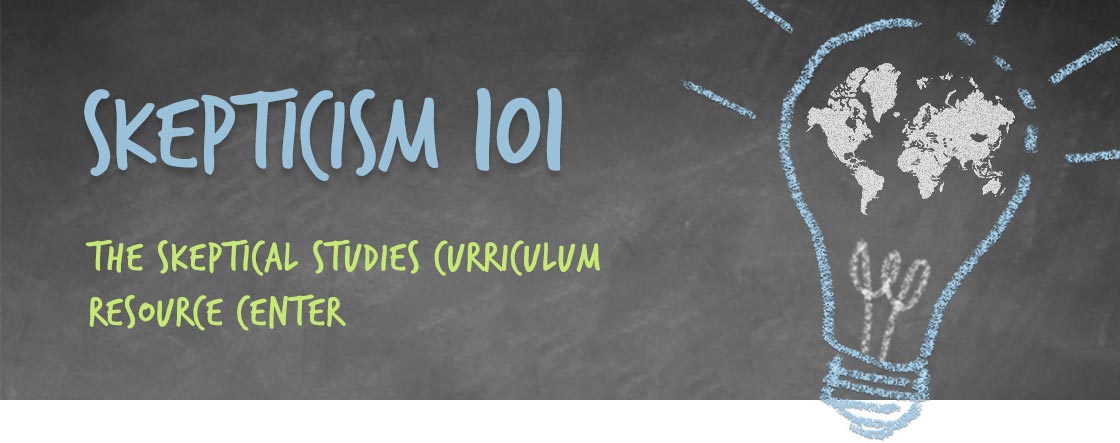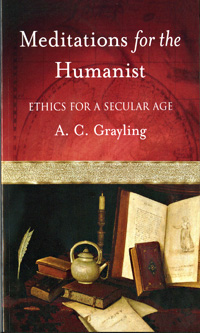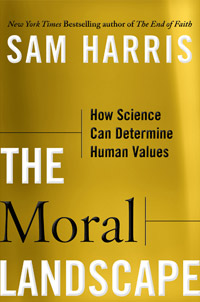You Are Browsing Resources on:
morality
In this lecture on Holocaust Denial, Dr. Michael Shermer employs the methods of science to history, showing how we can determine truth about the past. Many scholars in the humanities and social sciences do not consider history to be a science. Instead, they treat it as a field of competing narrative stories, no one of which has a superior claim to truth values than any others. But as Dr. Shermer replies to this assertion, are we to understand that those who assert that the Holocaust never happened have equal standing to those who assert that it did? Of course not! It is here where most cultural relativists get off the relativity train, acknowledging that, in fact, we can establish certain facts about the past, no less than we can about the present.
Skepticism 101: How to Think Like a Scientist covers a wide range of topics, from critical thinking, reasoning, rationality, cognitive biases and how thinking goes wrong, and the scientific methods, to actual claims and whether or not there is any truth to them, e.g., ESP, ETIs, UFOs, astrology, channelling, psychics, creationism, Holocaust denial, and especially conspiracy theories and how to think about them.
If you missed Dr. Shermer’s previous Skepticism 101 lectures watch them now.
Mentioned in this lecture
In Pathways to Evil, Part 2, Dr. Michael Shermer fleshes out the themes of Part 1 by exploring how the dials controlling our inner demons and better angels can be dialed up or down depending on circumstances and conditions. Are we all good apples but occasionally bad barrels turn good apples rotten, or do we all harbor the capacity to turn bad?
Skepticism 101: How to Think Like a Scientist covers a wide range of topics, from critical thinking, reasoning, rationality, cognitive biases and how thinking goes wrong, and the scientific methods, to actual claims and whether or not there is any truth to them, e.g., ESP, ETIs, UFOs, astrology, channelling, psychics, creationism, Holocaust denial, and especially conspiracy theories and how to think about them.
If you missed Dr. Shermer’s previous Skepticism 101 lectures watch them now.
In Part 1 of his Pathways to Evil lecture Dr. Michael Shermer considers the nature of evil in his attempt to answer the question of how you can get normal civilized, educated, and intelligent people to commit murder and even genocide. Are we basically good and made bad by evil situations, or are we basically evil and made good by civilized society?
Skepticism 101: How to Think Like a Scientist covers a wide range of topics, from critical thinking, reasoning, rationality, cognitive biases and how thinking goes wrong, and the scientific methods, to actual claims and whether or not there is any truth to them, e.g., ESP, ETIs, UFOs, astrology, channelling, psychics, creationism, Holocaust denial, and especially conspiracy theories and how to think about them.
If you missed Dr. Shermer’s previous Skepticism 101 lectures watch them now.
This course was taught at Chapman University during the spring 2013 semester as an undergraduate course.
Excerpt from Syllabus
This course addresses the evolutionary origins of morality, the developmental psychology of moral emotions, the historical course of moral development throughout the history of civilization, and the forces that have bent the arc of the moral universe toward truth, justice, freedom, and prosperity.
Students will look at how the arc of the moral universe bends toward truth, justice, freedom, and prosperity thanks to science the type of thinking that involves reason, rationality, empiricism, and skepticism. The Scientific Revolution led by Copernicus, Galileo, and Newton was so world-changing that thinkers in other fields consciously aimed at revolutionizing the social, political, and economic worlds using the same methods of science. This led to the Age of Reason and the Enlightenment, which in turn created the modern secular world of democracies, rights, justice, and liberty.
DOWNLOAD THIS RESOURCE
(209 kb PDF)
This book was required reading for Dr. Innes Mitchell’s course, “Perspectives on Atheism” taught at St. Edwards University during spring 2012.
“Magnanimity is in short supply,” writes A. C. Grayling is this wonderfully incisive book, “but it is the main ingredient in everything that makes the world a better place” And indeed Meditations for the Humanist: Ethics for a Secular Age is itself a generous, insightful, wide-ranging, magnanimous inquiry into the philosophical and ethical questions that bear most strongly on the human condition.
Containing nearly fifty linked commentaries on topics ranging from love, lying, perseverance, revenge, racism, religion, history, loyalty, health, and leisure, Meditations for the Humanist does not offer definitive statements but rather prompts to reflection. These brief essays serve as springboards to the kind of thoughtful examination without which, as Socrates famously claimed, life is not worth living. As Graying notes in his introduction, “It is not necessary to arrive at polished theories on all these subjects, but it is necessary to give them at least a modicum of thought if one’s life is to have some degree of shape and direction.” The book is divided into three sections-Virtues and Attributes, Foes and Fallacies, and Amenities and Goods-and within these sections essays are grouped into related clusters. But each piece can be read alone and each is characterized by brevity, wit, and a liveliness of mind that recalls the best of Montaigne and Samuel Johnson. Grayling’s own perspective on these subjects is broadened and deepened by liberal quotations from Sophocles and Shakespeare to Byron, Twain, Proust, Simone de Beauvoir, Martin Luther King, Jr., and many others.
For those wishing to explore ethical issues outside the framework of organized religious belief, Meditations for the Humanist offers an inviting map to the country of philosophical reflection.—Amazon
BUY THIS BOOK
from Amazon
This PowerPoint is part of a course titled, “Perspectives on Atheism“.
This presentation draws on the work of Dale McGowan, and addresses the following topics: (1) Prevalent cultural attitudes towards atheists; (2) Our evolved tendency towards moral behavior; (3) The campaign against labeling children; (4) McGowan’s “Seven Secular Values”; (5) The Purpose Driven Life; (6) Addressing Death with Children; (7) Creative Secular Rituals; and (8) McGowan’s “Best Practices” for raising freethinkers.
DOWNLOAD THIS RESOURCE
(101 MB Powerpoint Presentation)
This course was taught at Portland State University.
Excerpt from Syllabus
The fundamental learning objectives of this course are threefold: 1) to empower students to be trustful of reason and to give them hope that they can make better communities and live better lives, 2) to demonstrate that there are better and worse ways of reasoning morally, and that the process one uses to make moral decisions can either contribute to, or alleviate, real life suffering and misery, 3) to teach student not to withhold moral judgment, but how to make better, more discerning moral judgments.
This class has the potential to disabuse students of ideologies and specious reasoning processes that bring students’ beliefs out of lawful alignment with reality. Specifically, it is meant to be both an antidote and a prophylactic to pedagogical constructivism, cultural relativism, radical epistemological subjectivism and faith-based belief systems. As such, this course should be viewed more as a moral and cognitive intervention than as a cannon of information that needs to be disseminated, assimilated and then assessed.
DOWNLOAD THIS RESOURCE
(231 kb PDF)
From bands and tribes to chiefdoms and states, to become a Type 2.0 global civilization our polity and economy must evolve along with our science and technology. Politics, economics, and religion have been identified as a major cause of strife and conflict between nations. That’s too easy. The problem is not religion X or political party Y or economic ideology Z. The problem is tribalism. We are a social primate species, and as such we are exceptionally tribal.
Group identity is essential to our sense of self. Religious tribalism, political tribalism and economic tribalism have plagued our species since the birth of Civilization 1.0 starting 10,000 years ago. We need new science and technologies to reach Civilization 2.0, but without evolved political and economic systems, we will not make it. In this powerpoint, evidence will be presented in support of the observation of the 19th century social reformer and slave abolitionist Theodore Parker: “I do not pretend to understand the moral universe; the arc is a long one, my eye reaches but little ways; I cannot calculate the curve and complete the figure by the experience of sight; I can divine it by conscience. And from what I see I am sure it bends towards justice.”
DOWNLOAD THIS RESOURCE
(82 MB Powerpoint Presentation)
This course was taught at St. Edwards University in spring 2012.
Excerpt from Syllabus
American mythology claims the United States is a Christian nation, increasingly accepting of all denominations and faiths. What about non-belief? Should atheism be written into, and become part of the American story? Has it already? From a rhetorical perspective this course will address a variety of related questions:
- What are the narratives of atheism? Whose voices tell the stories and what are their interests?
- What are the arguments for atheism?
- How is atheism framed, both positively and negatively?
- Why has “New Atheism” appeared recently as a social movement? What are the aspirations of the movement, the strategies used for altering perspectives, and who are their audiences?
This course will examine four different perspectives from which to view these issues:
- The personal perspective of “Letting Go of God”
- The critical perspective taking religion as its object
- The social perspective examining secularism in a free society
- The ethical perspective addressing the tenets of secular humanism.
There is an alternative American myth claiming the United States is a beacon of Liberty, carrying the torch of progressive values, scientific endeavor, and human rights ignited by the Enlightenment. Which American myth appeals to us? This overarching question will guide our journey.
DOWNLOAD THIS RESOURCE
(420 kb PDF)
In this lecture Shermer addresses three aspects of evolution and economics: (1) How the market has a mind of its own—that is, how economies evolved from hunter-gathering to consumer-trading. (2) How minds operate in markets—that is, how the human brain evolved to operate in a hunter-gatherer economy but must function in a consumer-trader economy. (3) How minds and markets are moral—that is, how moral emotions evolved to enable us to cooperate and how this capacity facilitates fair and free trade.
DOWNLOAD THIS RESOURCE
(58 MB Powerpoint Presentation)
The Origins of Morality and How to be Good Without God
In The Science of Good and Evil, a lecture based on the third volume in his trilogy on the power of belief, Dr. Shermer tackles two of the deepest and most challenging problems of our age: (1) The origins of morality and (2) the foundations of ethics. Does evil exist, and if so, what is the nature of evil? Is it in our nature to be moral, immoral, or amoral? If we evolved by natural forces then what was the natural purpose of morality? If we live in a determined universe, then how can we make free moral choices? Why do bad things happen to good people? Is there justice in the world beyond the social order? If there is no outside source to validate moral principles, does anything go? Can we be good without God? In this stunning conclusion to an intellectual journey into the mind and soul of humanity, Dr. Shermer peels back the inner layers covering our core being to reveal a complexity of human motives—selfish and selfless, cooperative and competitive, virtue and vice, good and evil, moral and immoral—and how these motives came into being as a product of both our evolutionary heritage and cultural history, and how we can construct an ethical system that generates a morality that is neither dogmatically absolute nor irrationally relative, a rational morality for an age of science.
DOWNLOAD THIS RESOURCE
(69 MB Powerpoint Presentation)
Taken from the chapter in his book The Believing Brain on the psychology of political beliefs, Dr. Shermer considers how belief systems operate in the realm of politics, economics, and ideologies. He reviews the research on why people vote Republican or Democrat, why we are so predictable in our political beliefs that if you know where someone stands on, say, abortion, you can predict where they stand on a number of other political issues, and what these political beliefs say about the nature of human nature.
DOWNLOAD THIS RESOURCE
(34 MB Powerpoint Presentation)
In this lecture, Dr. Shermer integrates several strands of thought on the evolution of morality, ethics, the history of civilization, and how to be good without god by creating a society that accentuates the positive aspects of human nature while attenuating the negative aspects. He shows how and why both liberal democracy and free trade lead to better societies and that we can “rise above” our inner demons by bringing out the better angels of our nature.
DOWNLOAD THIS RESOURCE
(87 MB Powerpoint Presentation)
This book was required reading for the following courses: (1) “Evolution, Economics, and the Brain” taught by Michael Shermer, and (2) “Knowledge, Value & Rationality” taught by Peter Boghossian.
Sam Harris’s first book, The End of Faith, ignited a worldwide debate about the validity of religion. In the aftermath, Harris discovered that most people—from religious fundamentalists to nonbelieving scientists—agree on one point: science has nothing to say on the subject of human values. Indeed, our failure to address questions of meaning and morality through science has now become the most common justification for religious faith. It is also the primary reason why so many secularists and religious moderates feel obligated to “respect” the hardened superstitions of their more devout neighbors.
—Amazon
In this explosive new book, Sam Harris tears down the wall between scientific facts and human values, arguing that most people are simply mistaken about the relationship between morality and the rest of human knowledge. Harris urges us to think about morality in terms of human and animal well-being, viewing the experiences of conscious creatures as peaks and valleys on a “moral landscape.” Because there are definite facts to be known about where we fall on this landscape, Harris foresees a time when science will no longer limit itself to merely describing what people do in the name of “morality”; in principle, science should be able to tell us what we ought to do to live the best lives possible. Bringing a fresh perspective to age-old questions of right and wrong and good and evil, Harris demonstrates that we already know enough about the human brain and its relationship to events in the world to say that there are right and wrong answers to the most pressing questions of human life. Because such answers exist, moral relativism is simply false—and comes at increasing cost to humanity. And the intrusions of religion into the sphere of human values can be finally repelled: for just as there is no such thing as Christian physics or Muslim algebra, there can be no Christian or Muslim morality.—Skeptic
BUY THIS BOOK
from Shop Skeptic











